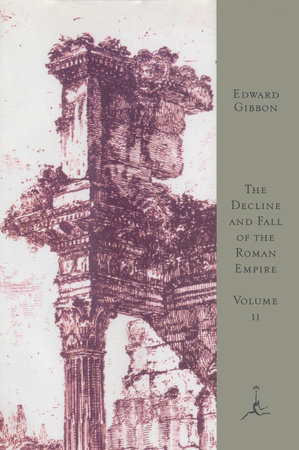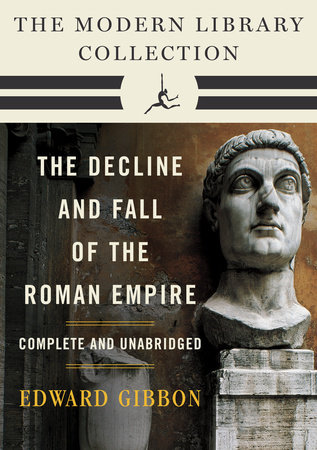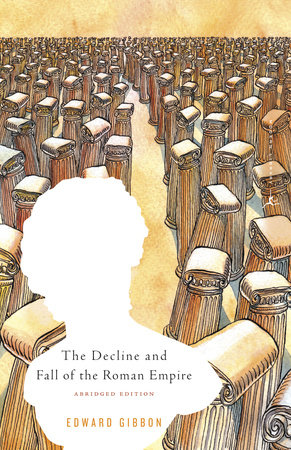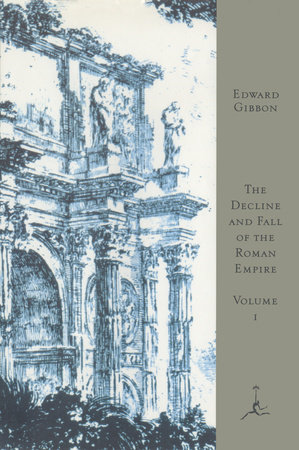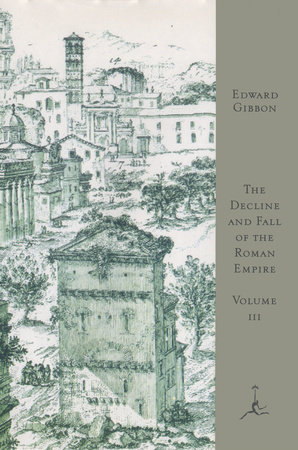Excerpt
The Decline and Fall of the Roman Empire, Volume II
XXVII
DEATH OF GRATIAN · RUIN OF ARIANISM · ST. AMBROSE · FIRST CIVIL WAR, AGAINST MAXIMUS · CHARACTER, ADMINISTRATION, AND PENANCE OF THEODOSIUS · DEATH OF VALENTINIAN II. · SECOND CIVIL WAR, AGAINST EUGENIUS · DEATH OF THEODOSIUS · CORRUPTION OF TIMES · INFANTRY DISARM
The fame of Gratian, before he had accomplished the twentieth year of his age, was equal to that of the most celebrated princes. His gentle and amiable disposition endeared him to his private friends, the graceful affability of his manners engaged the affection of the people: the men of letters, who enjoyed the liberality, acknowledged the taste and eloquence, of their sovereign; his valour and dexterity in arms were equally applauded by the soldiers; and the clergy considered the humble piety of Gratian as the first and most useful of his virtues. The victory of Colmar had delivered the West from a formidable invasion; and the grateful provinces of the East ascribed the merits of Theodosius to the author of his greatness and of the public safety. Gratian survived those memorable events only four or five years; but he survived his reputation; and, before he fell a victim to rebellion, he had lost, in a great measure, the respect and confidence of the Roman world.
The remarkable alteration of his character or conduct may not be imputed to the arts of flattery which had besieged the son of Valentinian from his infancy; nor to the headstrong passions which that gentle youth appears to have escaped. A more attentive view of the life of Gratian may perhaps suggest the true cause of the disappointment of the public hopes. His apparent virtues, instead of being the hardy productions of experience and adversity, were the premature and artificial fruits of a royal education. The anxious tenderness of his father was continually employed to bestow on him those advantages which he might perhaps esteem the more highly, as he himself had been deprived of them; and the most skilful masters of every science and of every art had laboured to form the mind and body of the young prince.1 The knowledge which they painfully communicated was displayed with ostentation and celebrated with lavish praise. His soft and tractable disposition received the fair impression of their judicious precepts, and the absence of passion might easily be mistaken for the strength of reason. His preceptors gradually rose to the rank and consequence of ministers of state;2 and, as they wisely dissembled their secret authority, he seemed to act with firmness, with propriety and with judgment, on the most important occasions of his life and reign. But the influence of this elaborate instruction did not penetrate beyond the surface; and the skilful preceptors, who so accurately guided the steps of their royal pupil, could not infuse into his feeble and indolent character the vigorous and independent principle of action which renders the laborious pursuit of glory essentially necessary to the happiness, and almost to the existence, of the hero. As soon as time and accident had removed those faithful counsellors from the throne, the emperor of the West insensibly descended to the level of his natural genius; abandoned the reins of government to the ambitious hands which were stretched forwards to grasp them; and amused his leisure with the most frivolous gratifications. A public sale of favour and injustice was instituted, both in the court and in the provinces, by the worthless delegates of his power, whose merit it was made sacrilege to question. The conscience of the credulous prince was directed by saints and bishops,3 who procured an Imperial edict to punish as a capital offence, the violation, the neglect, or even the ignorance of the divine law. Among the various arts which had exercised the youth of Gratian, he had applied himself with singular inclination and success to manage the horse, to draw the bow, and to dart the javelin; and these qualifications, which might be useful to a soldier, were prostituted to the viler purposes of hunting. Large parks were enclosed for the Imperial pleasures, and plentifully stocked with every species of wild beasts; and Gratian neglected the duties, and even the dignity, of his rank, to consume whole days in the vain display of his dexterity and boldness in the chase. The pride and wish of the Roman emperor to excell in an art in which he might be surpassed by the meanest of his slaves reminded the numerous spectators of the examples of Nero and Commodus; but the chaste and temperate Gratian was a stranger to their monstrous vices; and his hands were stained only with the blood of animals.
The behaviour of Gratian, which degraded his character in the eyes of mankind, could not have disturbed the security of his reign, if the army had not been provoked to resent their peculiar injuries. As long as the young emperor was guided by the instructions of his masters, he professed himself the friend and pupil of the soldiers; many of his hours were spent in the familiar conversation of the camp; and the health, the comforts, the rewards, the honours, of his faithful troops appeared to be the object of his attentive concern. But, after Gratian more freely indulged his prevailing taste for hunting and shooting, he naturally connected himself with the most dexterous ministers of his favourite amusement. A body of the Alani was received into the military and domestic service of the palace; and the admirable skill which they were accustomed to display in the unbounded plains of Scythia was exercised, on a more narrow theatre, in the parks and inclosures of Gaul. Gratian admired the talents and customs of these favourite guards, to whom alone he entrusted the defence of his person: and, as if he meant to insult the public opinion, he frequently shewed himself to the soldiers and people, with the dress and arms, the long bow, the sounding quiver, and the fur garments of a Scythian warrior. The unworthy spectacle of a Roman prince who had renounced the dress and manners of his country filled the minds of the legions with grief and indignation.5 Even the Germans, so strong and formidable in the armies of the empire, affected to disdain the strange and horrid appearance of the savages of the North, who, in the space of a few years, had wandered from the banks of the Volga to those of the Seine. A loud and licentious murmur was echoed through the camps and garrisons of the West; and, as the mild indolence of Gratian neglected to extinguish the first symptoms of discontent, the want of love and respect was not supplied by the influence of fear. But the subversion of an established government is always a work of some real, and of much apparent, difficulty; and the throne of Gratian was protected by the sanctions of custom, law, religion, and the nice balance of the civil and military powers, which had been established by the policy of Constantine. It is not very important to inquire from what causes the revolt of Britain was produced. Accident is commonly the parent of disorder; the seed of rebellion happened to fall on a soil which was supposed to be more fruitful than any other in tyrants and usurpers;6 the legions of that sequestered island had been long famous for a spirit of presumption and arrogance; and the name of Maximus was proclaimed by the tumultuary but unanimous voice both of the soldiers and of the provincials. The emperor, or the rebel, for his title was not yet ascertained by fortune, was a native of Spain, the countryman, the fellow-soldier, and the rival of Theodosius, whose elevation he had not seen without some emotions of envy and resentment. The events of his life had long since fixed him in Britain; and I should not be unwilling to find some evidence for the marriage which he is said to have contracted with the daughter of a wealthy lord of Caernarvonshire.7 But this provincial rank might justly be considered as a state of exile and obscurity; and, if Maximus had obtained any civil or military office, he was not invested with the authority either of governor or general.8 His abilities, and even his integrity, are acknowledged by the partial writers of the age; and the merit must indeed have been conspicuous, that could extort such a confession in favour of the vanquished enemy of Theodosius. The discontent of Maximus might incline him to censure the conduct of his sovereign, and to encourage, perhaps without any views of ambition, the murmurs of the troops. But in the midst of the tumult he artfully, or modestly, refused to ascend the throne; and some credit appears to have been given to his own positive declaration that he was compelled to accept the dangerous present of the Imperial purple.


